Feb 21, 2025 – Day 5 of the 100-Day Dharma Talk, Friday Dharma Q&A, Peace Foundation Board Meeting, General Assembly of the Incorporated Association
Hello. Today is the 5th day of Venerable Pomnyun Sunim’s 100-Day Dharma Talk. Throughout the day, the Friday Dharma Q&A, Peace Foundation Board Meeting, and General Assembly of the Incorporated Association were held at the Jungto Social and Cultural Center.
After completing his morning practice and meditation, Sunim headed to the Jungto Social and Cultural Center. He began the day by attending the regular board meeting of Good Friends at 8 AM.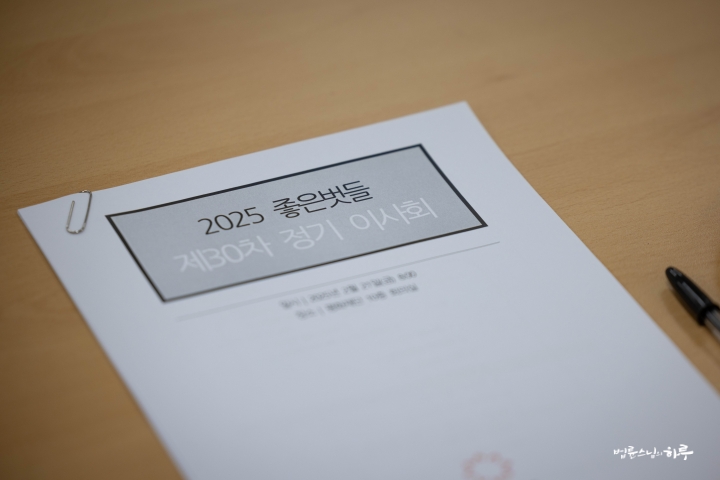
Good Friends is an organization founded by Sunim in 1996 to work towards reconciliation and cooperation between North and South Korea, provide humanitarian aid to North Korean residents, improve human rights, and accelerate peaceful reunification of the Korean peninsula through cooperation with overseas Koreans. The board meeting concluded after reviewing and approving the 2024 business report and settlement, as well as the 2025 business plan and budget.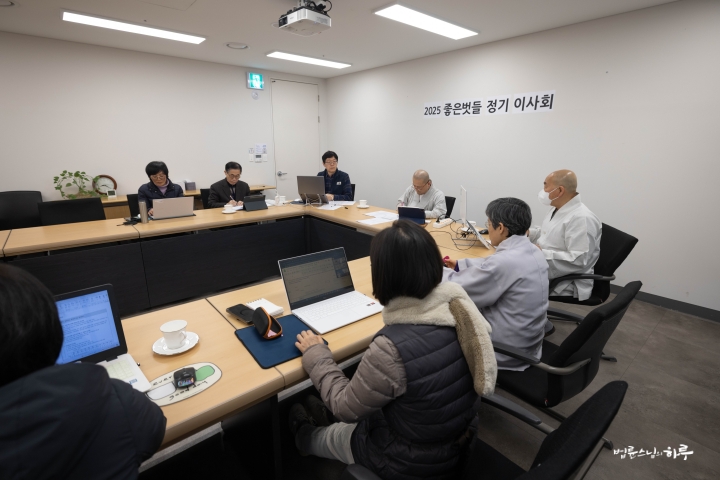
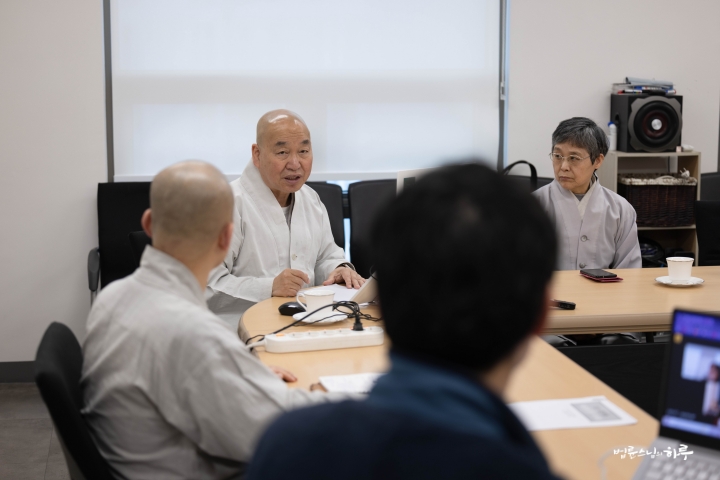
Sunim then headed to the underground auditorium to give the Friday Dharma Q&A lecture. Many volunteers were welcoming citizens who had come to listen to the Dharma Q&A since early morning.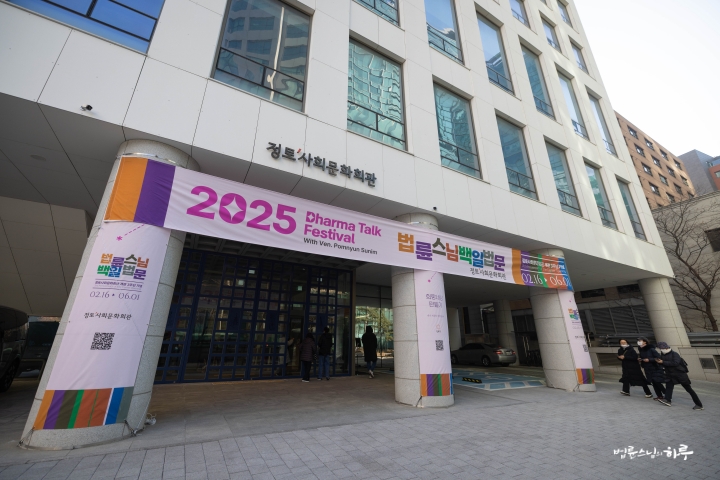
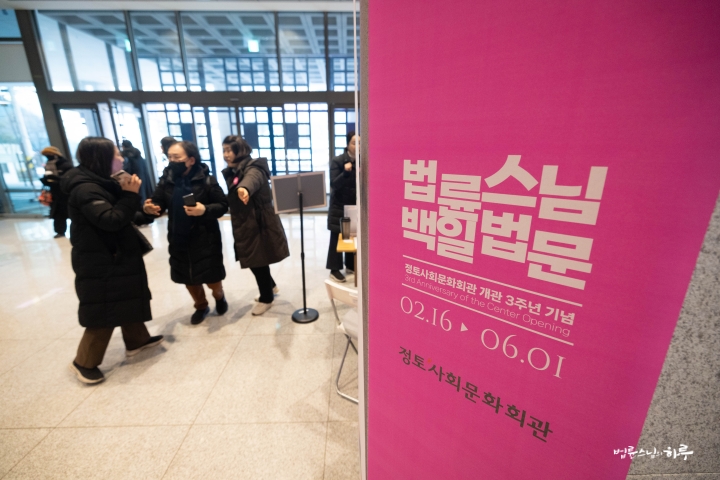
At 10:15 AM, with about 250 people in attendance, the Friday Dharma Q&A lecture began with the recitation of the Three Refuges and Words for Practice. About 3,300 people were connected to the YouTube live stream.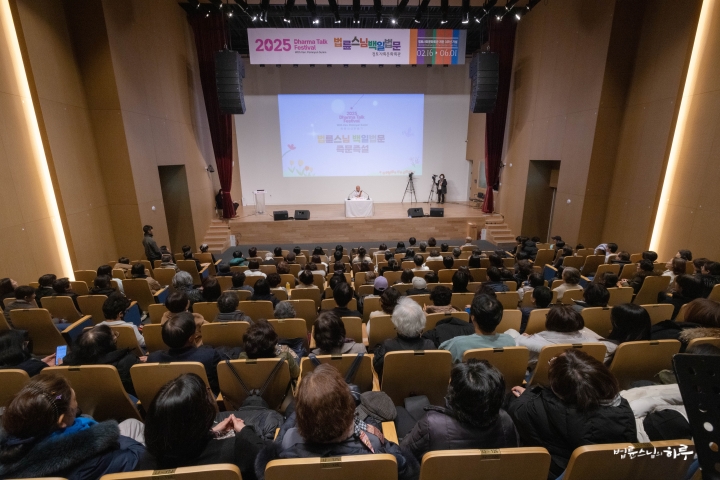
First, Sunim greeted the audience and viewers.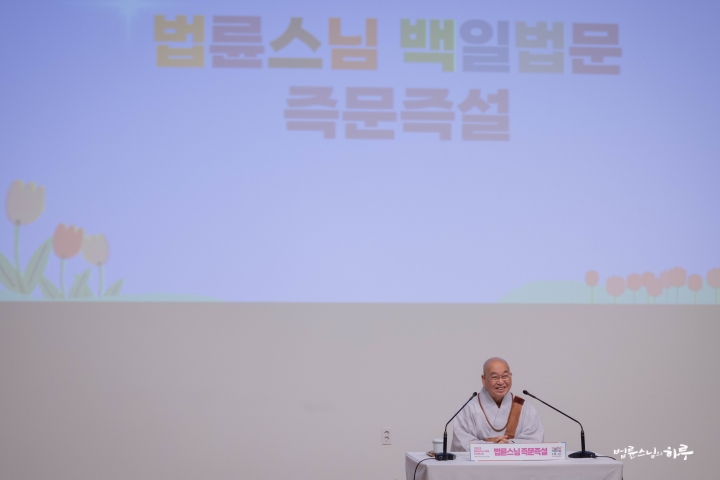
“Today is the 5th day of the 100-Day Dharma Talk, and it’s time for Dharma Q&A. This is a time for you to freely discuss any doubts or difficulties you experience in your life or practice.
Dharma Q&A is not about preparing questions in advance, but rather about casually discussing your current most challenging issues or curiosities. We call it ‘immediate discourse’ rather than ‘immediate answer’ because ‘answer’ implies a correct response to specific knowledge. For example, answering ‘the Nile River’ to the question ‘What is the longest river in the world?’ However, ‘immediate discourse’ is a process of resolving doubts or alleviating suffering through conversation. This kind of conversation is also called a sermon, dharma talk, or preaching. Dharma Q&A is a process of discussing life issues and becoming free from those problems through light conversation. So, anyone can feel free to ask questions.” 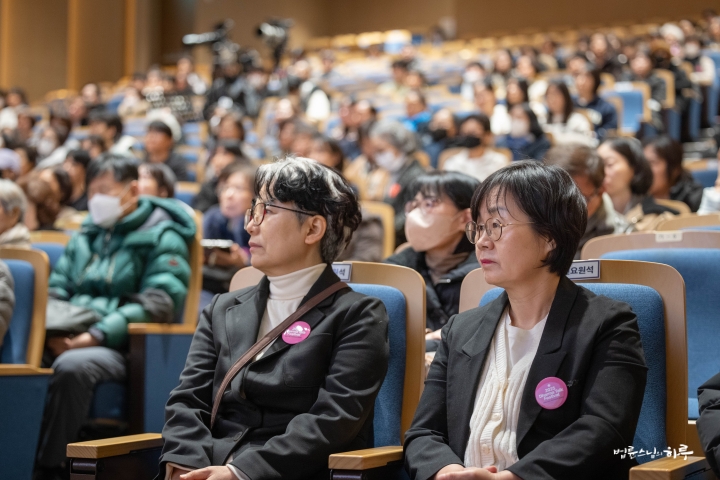
Following the pre-registered questions, Sunim engaged in conversations with attendees. There was also time for spontaneous questions from the audience. Today, many young people attended and asked questions to Sunim. One of them mentioned that his parents were experiencing financial difficulties and were considering selling their gold. He asked for advice on how far, as a child, he should go in supporting his parents to be filial.
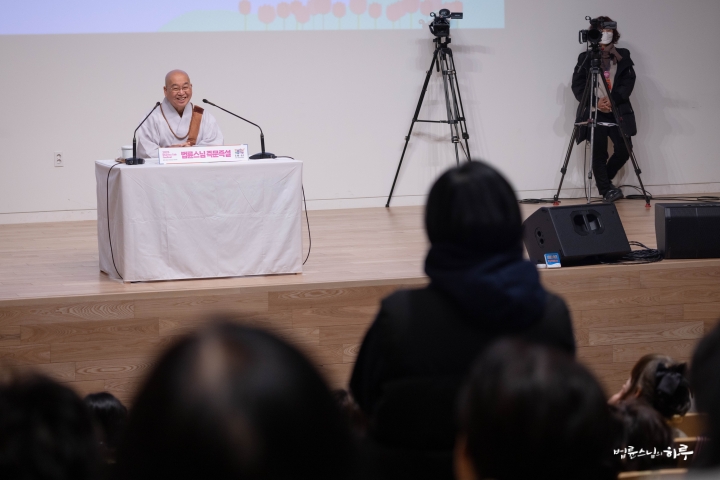
How Far Should We Support Parents Facing Financial Difficulties?
“You’re having a happy dilemma. It’s not really something to worry about. You want to take out a loan to help your parents, but you’re concerned your mother might feel bad about it. You don’t need to worry about that. Even between parents and children, people generally appreciate receiving money. So you don’t need to worry about that aspect at all. (Laughs)
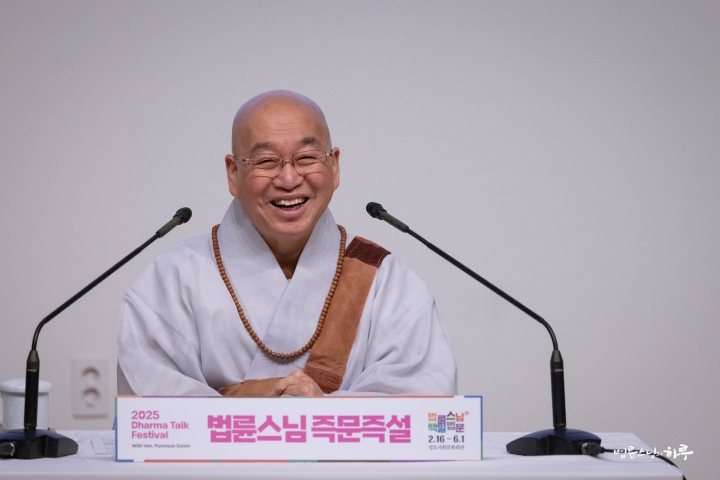
However, you need to clearly understand that if you give them money, it will be difficult to get it back. Of course, your mother might want to repay it, but your father is facing retirement, and your mother’s real estate business is unlikely to recover anytime soon. Ultimately, their financial situation is likely to become increasingly tight. In this situation, if you give them money once, they’ll likely need more in a few months, and if you help again, this cycle is likely to repeat. Eventually, both your parents and you could end up in financial ruin.
When a business isn’t doing well, it’s sometimes necessary to decisively stop and reorganize. If you go gambling and lose your initial stake, you should be able to dust off your hands and say, ‘That’s it for today,’ to avoid losing your house. But if you stay, thinking you’ll recover your losses, you might end up losing even your house.
Therefore, your parents should cut their expenses now. They should use their existing money frugally, live on their pension, and halt any major expenditures. It’s better to start again when the economy improves. If they try to hold on by borrowing money, they’ll end up losing even more.
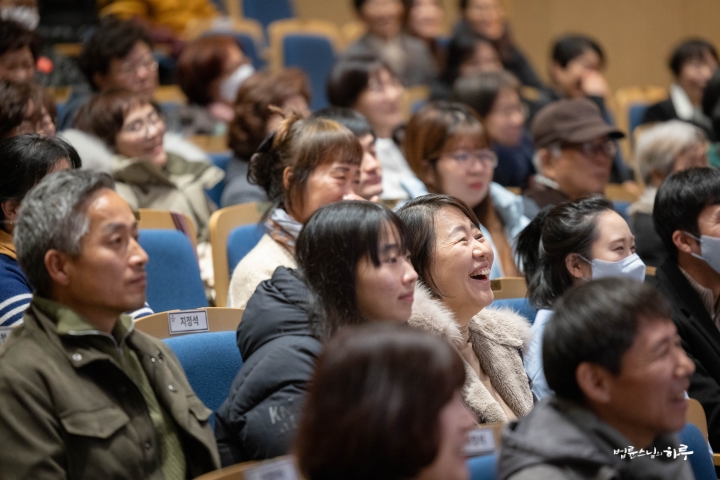
It might be better to let your parents lose what they have and pretend not to know about it. True help comes when you assist them when they are truly in dire straits with nowhere to go. If you help them right now, the money you give will be spent first, and your parents will continue to invest their remaining assets. Eventually, you’ll no longer be able to help, and your parents will likely end up in an even more difficult situation.
Whether they sell gold rings or anything else is not a crucial issue. Gold prices are rising these days, so it might be good to sell now, right? They might go up further, but anyway, your parents should resolve the issue by selling what they currently have. This way, they won’t feel indebted to their children, and you won’t lose money either. If your parents beg for money and you can’t give it, you might feel guilty, but if they don’t ask, it’s better to pretend not to know. If they ask, “Should we sell the gold rings?” you can reply, “It’s better not to, but do you have any other options?” and then just walk out the door.”
“I understand. Thank you.”
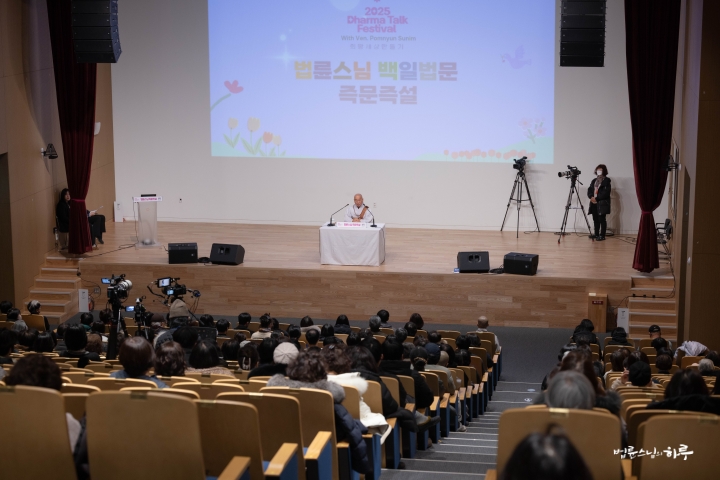
For about an hour and a half, six people were able to have conversations with Sunim. Since there would be another Dharma Q&A session in the evening, it was decided to continue with any unfinished questions from the morning. The lecture concluded as it approached noon.
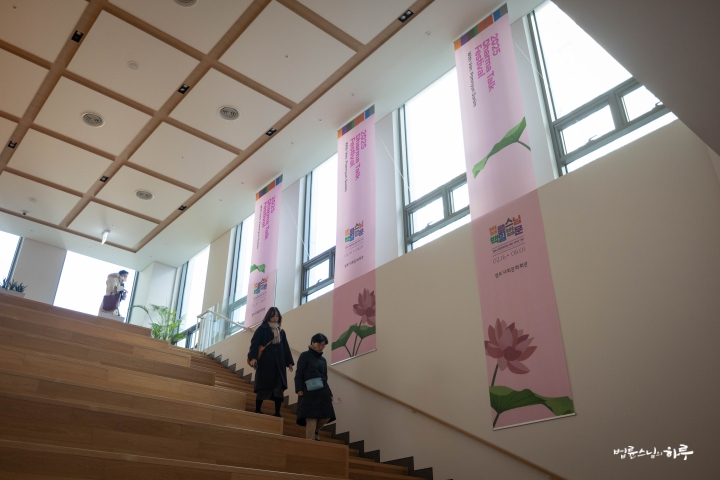
After lunch, at 1 PM, the regular board meeting began in the Peace Foundation’s conference room. With all the board members of the Peace Foundation gathered in one place, Sunim, as the chairman, gave an opening address.
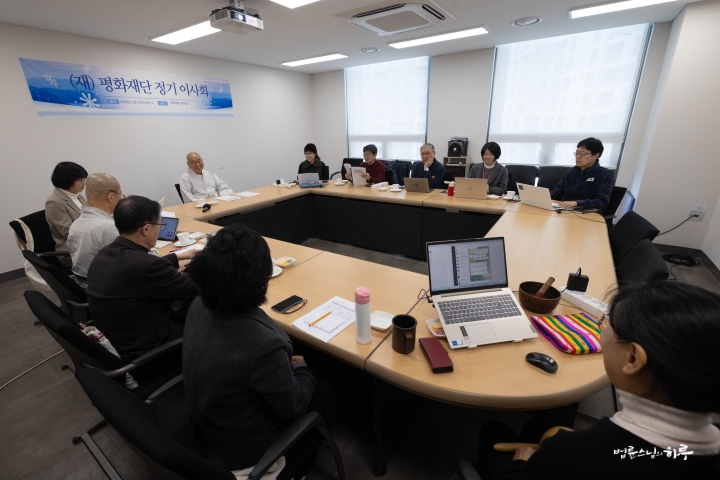
“Last year marked the 20th anniversary of the Peace Foundation’s establishment. I would like to express my gratitude to the research fellows and the executive director for leading the preparation of the commemorative event along with the staff. Last year, there was a very high risk of war breaking out on the Korean Peninsula. Fortunately, with the election of President Trump in the United States and the failure of the martial law plan in Korea, tensions on the Korean Peninsula have eased significantly. Although the situation is not completely resolved, I hope that once the war between Russia and Ukraine ends and dialogue between North Korea and the United States begins, the Korean Peninsula will return to a peaceful state. The first half of this year may be chaotic due to uncertainties in domestic politics, but I believe that once a new leader is decided, domestic politics will stabilize to some extent. The main goal of the Peace Foundation is peace on the Korean Peninsula, and it’s fortunate that we’ve managed to overcome the worrisome situation for now. When the domestic and international atmosphere improves, I hope we can take strong steps towards the peace and unification of the Korean Peninsula that we’ve dreamed of. I ask for everyone’s continued hard work this year as well.”
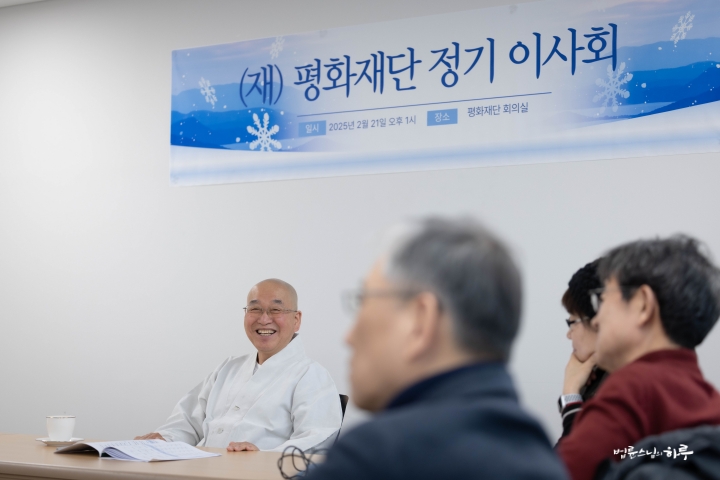
Following this, there was a report on the business performance and financial settlement for 2024, as well as a presentation of the business plan and budget for 2025. All board members unanimously approved the business plan and budget.
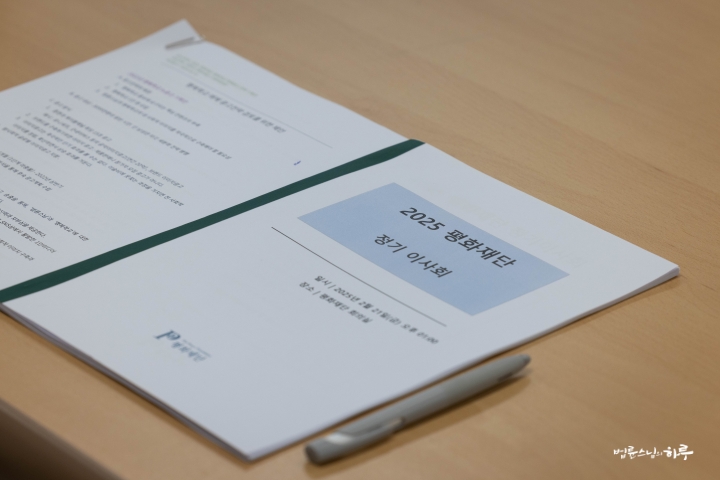
Immediately after, from 3 PM, Sunim attended the general meetings of three non-profit organizations: JTS, Eco Buddha, and Good Friends. While most of the assembly members participated online, Sunim and a few executives conducted the meeting offline.
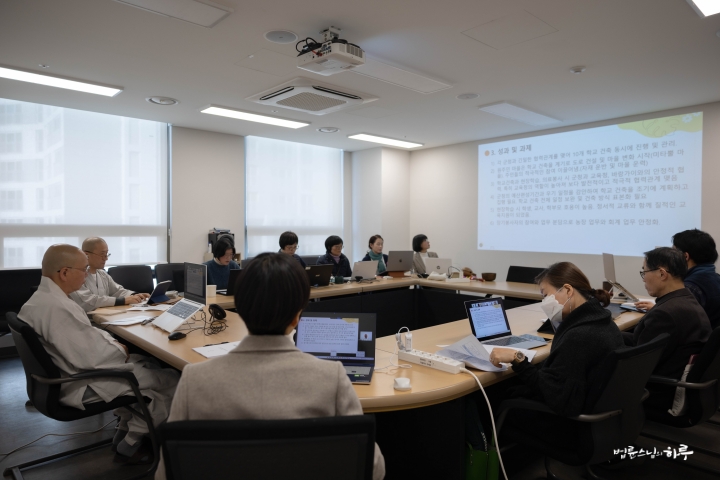
The JTS general meeting was held first, followed by the Eco Buddha meeting, and lastly, the Good Friends meeting. All assembly members approved the 2024 business report and financial settlement, as well as the 2025 business plan and budget.
“Do you approve the business plan and budget? Those in favor, please raise your hands.”
“Yes! Thank you.”
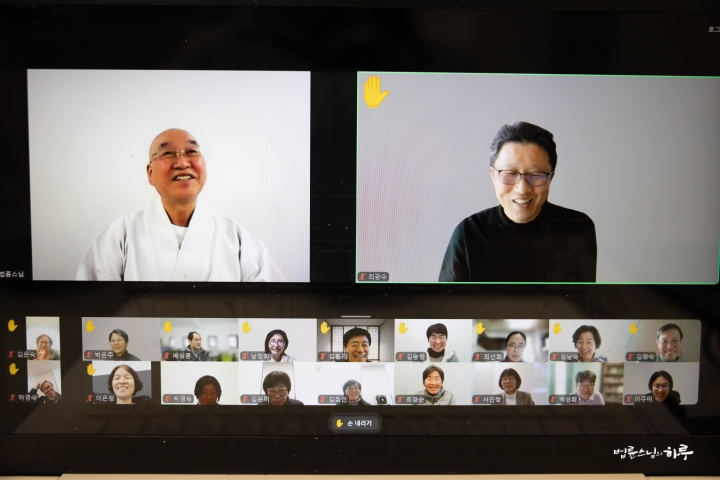
As the general meetings of the three non-profit organizations concluded, the sun had set.

At 7:30 PM, Sunim continued with the Friday Dharma Q&A lecture in the underground auditorium. Many citizens came to the Jungto Social and Cultural Center to attend the Dharma Q&A. They registered on-site or submitted questions before heading to the underground auditorium with light steps.
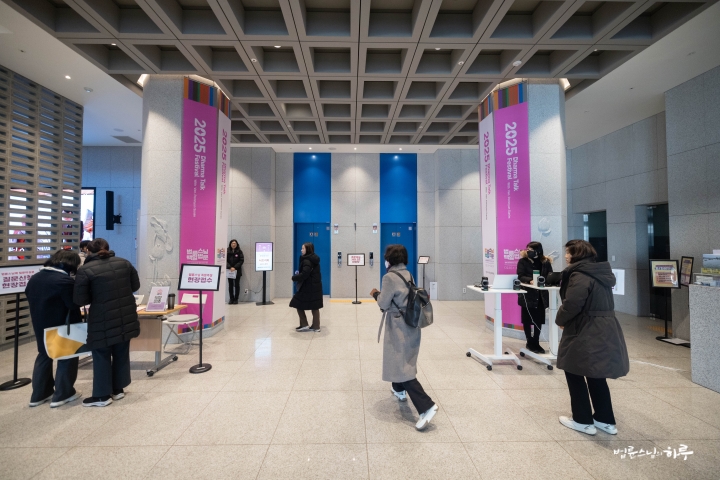
The lecture began with about 5,400 people connected via YouTube and 300 people present at the venue. After an opening performance, the Three Refuges and Words for Practice were recited, and then Sunim took his place on the stage. He explained the purpose of the Dharma Q&A and immediately began taking questions from the audience.
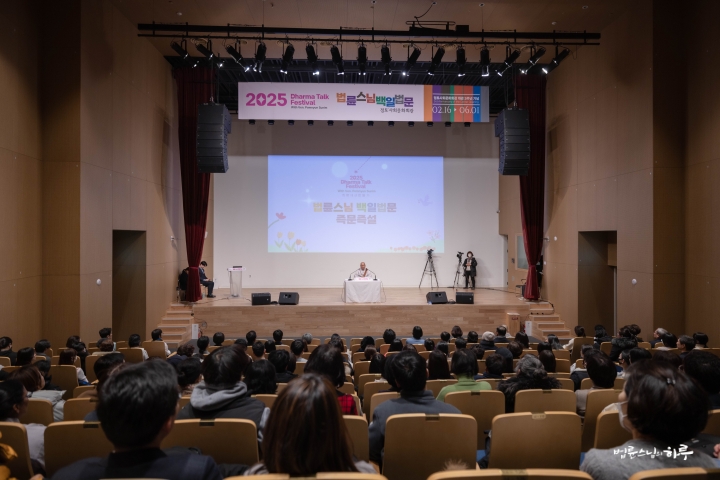
Over the course of an hour and a half, six people raised their hands to engage in dialogue with Sunim. Among the questioners was a middle school student.
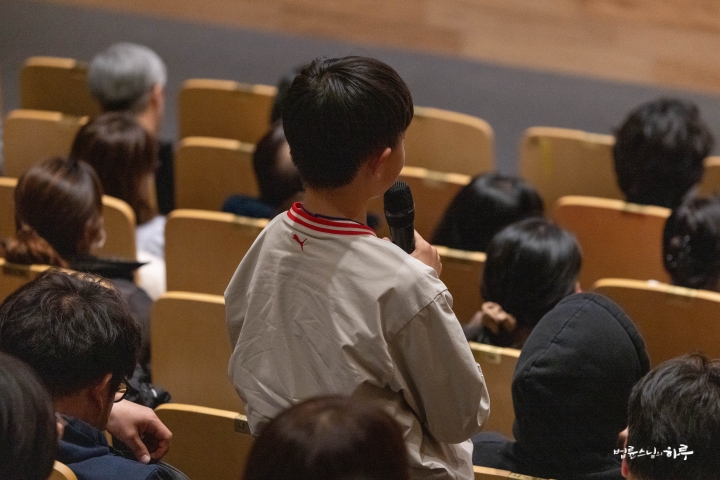
Is There a Way to Stop My Father’s Nagging?
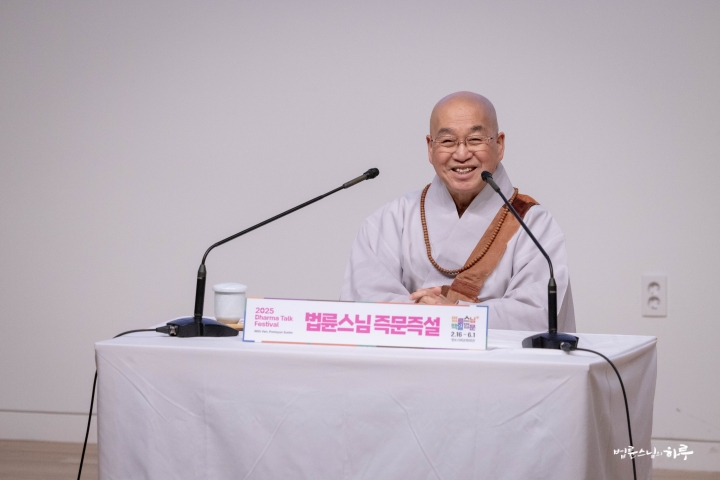
“There is no such method. There are ways to change how I behave, but there are no methods to change others.
If you want to find a way, there are two options. First, you could grow up quickly and become stronger. Then you could forcibly close your father’s mouth when he talks too much. But right now, you lack the strength to do that. Second, you could help your father understand that talking too much is harmful to others. You need to persuade your father. In other words, you either need the ability to persuade your father or the power to control him forcefully. Without these two things, you can’t change others.
That’s why the Buddha said, ‘Don’t try to change others, only focus on how you can change yourself.’ It means you should turn your gaze inward instead of outward. He also said, ‘Conquering yourself is a greater victory than conquering a million-strong army.’ There is no way for you to change your father.”
“Thank you. I understand now.”
As the student quickly grasped Sunim’s words and sat down, everyone gave a big round of applause.
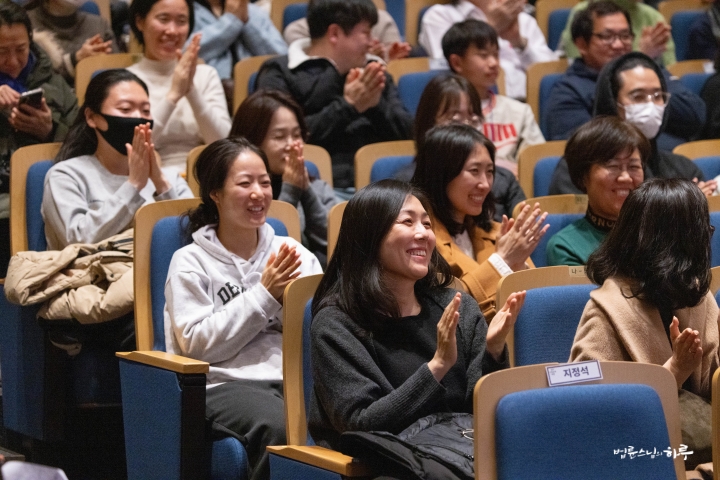
One questioner shared concerns about her career path, explaining that she had dropped out of their original major because they didn’t like it, then re-enrolled, but now felt that this new path also didn’t suit her aptitude.
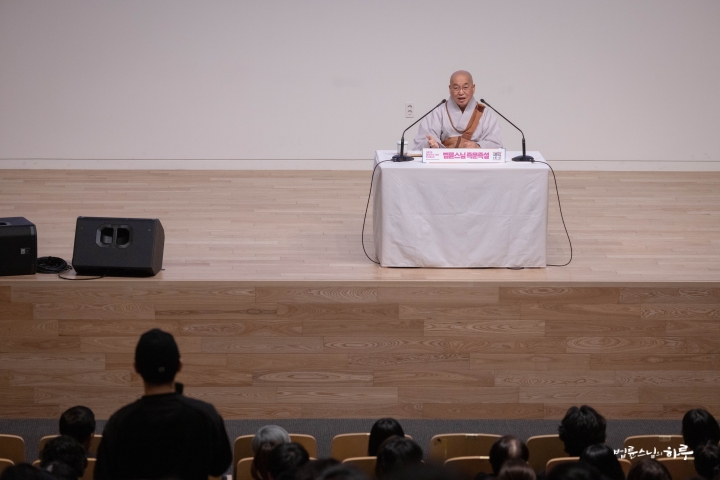
I Don’t Think My Major Suits Me—Is It Too Late to Switch?
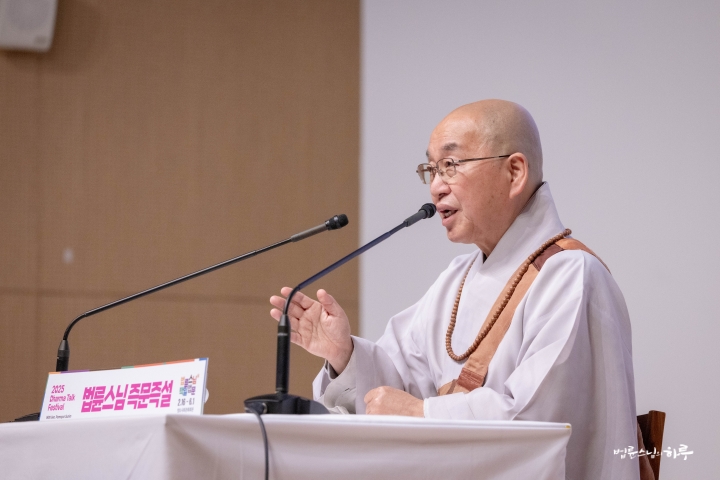
“You chose major A, but found it didn’t suit you, so you switched to B, and now you feel B doesn’t fit either. Some might see this as repeating a mistake. But I don’t think so. When you first chose A and discovered it didn’t match your aptitude, that was a significant achievement. Even if it took a year to realize this, it was worth the investment. Then you chose B, and realizing that it doesn’t fit either is also an important discovery. The realization that ‘I thought B would work since A didn’t, but that’s not the case either’ is very valuable. Therefore, the process of choosing A and B is absolutely not a waste of your life.
You mentioned considering a job at a regular company and living an ordinary life. Some companies require specific majors, while many don’t. In fact, most general companies hire regardless of major. Because of that, I think attending college just for the sake of it can be a huge waste—for both the country and the individual. In other countries, only those who really need a specific major go to university. But in our country, reality dictates that many people go to university because it leads to better treatment in the workplace. Often, even after working for four years after high school graduation, one might earn less than the starting salary of a university graduate.
In contrast, in countries like Germany, even university graduates might initially earn less than those who started working right after high school. It may take time for salaries to equalize as experience accumulates. This wage structure is much more efficient for both individuals and workplaces. There’s no need for the average person to go to university unnecessarily.
For fields requiring technical skills, the teenage years are when one can learn most sensitively and quickly. However, in our country, many people go to university without a clear purpose, graduate, and then spend time without any special skills. As they pass their mid-twenties, it becomes harder to learn new things, and they lose interest. This leads to a severe waste of human resources. 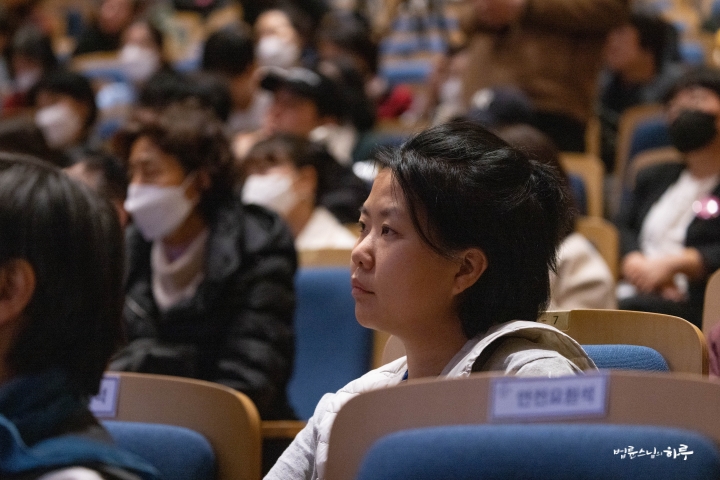
What, then, should one absolutely major in when attending university? For example, to become a doctor or nurse, one must study related majors. Also, while the current medical system requires professional qualifications, necessitating university education, this wasn’t always the case in the past. Looking at the history of traditional Korean medicine, not everyone who became a Korean medicine doctor necessarily had a license. After studying under an outstanding teacher for several years, one could treat patients. The same was true for driving. Before the driver’s license system was implemented, one could become a driver after working as an assistant under a skilled driver for a few years. This is the apprenticeship training system. A prime example of this apprenticeship method that still exists today is the doctoral program in graduate schools. One becomes a doctor by running errands for the advisor, writing papers, studying, and receiving the advisor’s approval. One doesn’t become a doctor just by making a groundbreaking discovery that even the professor doesn’t know about.
In the past bar exam system, one could become a lawyer by passing the exam without graduating from law school. However, nowadays, one must go through law school to be eligible for the bar exam. In the current era of professional qualification exams, jobs are guaranteed for those who pass these exams. But as we enter the full-fledged AI era and AI becomes more commonplace, the popularity of these professions will gradually decline. Fields requiring professional qualifications are job categories with certain principles and rules, which AI can quickly learn. What takes a person three years to learn, AI might master in just five minutes. 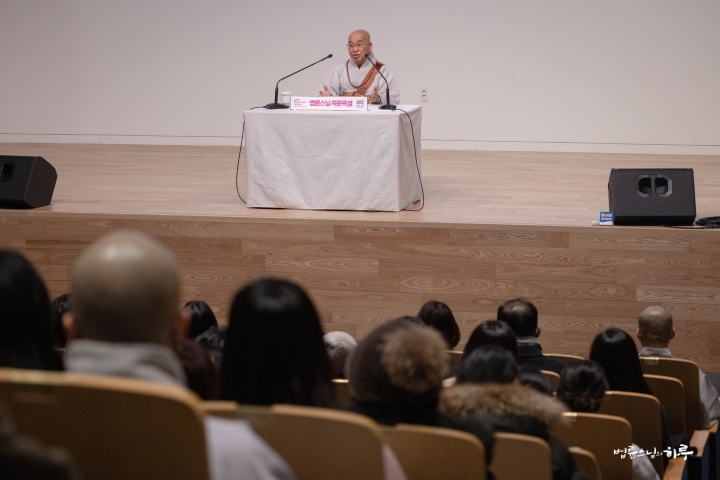
Of course, it would be difficult for artificial intelligence to master something like Sunim’s Dharma Q&A. While at first glance, there might seem to be a set principle in Dharma Q&A, life is not simple, and it’s challenging to find an accurate path beyond general answers with just 10,000 examples. Considering the countless possibilities in life, 10,000 cases are far from sufficient.
While specialized systems require specific college majors, for general workplace positions, there’s little difference whether one majored in music or German literature. Graduating in German literature doesn’t necessarily mean working in German-related institutions, just as a Buddhist studies major doesn’t automatically lead to working in a temple. Most people work in fields unrelated to their majors.
If the questioner simply needs a college degree rather than a specific major, it’s best to graduate quickly. Afterward, they can find employment in places that don’t require specialized qualifications. They might even be able to utilize their major in their job. For example, a psychology graduate who becomes a police officer could focus on criminal psychology, beyond general police duties. Similarly, someone with an education degree working in a regular company might handle in-house training. Graduating in psychology or education doesn’t limit one to pursuing psychology certifications or teaching in schools. Law school graduates aren’t restricted to becoming lawyers, judges, or prosecutors. Legal knowledge is needed in all areas of society, so it can be applied in various corporate settings as well. 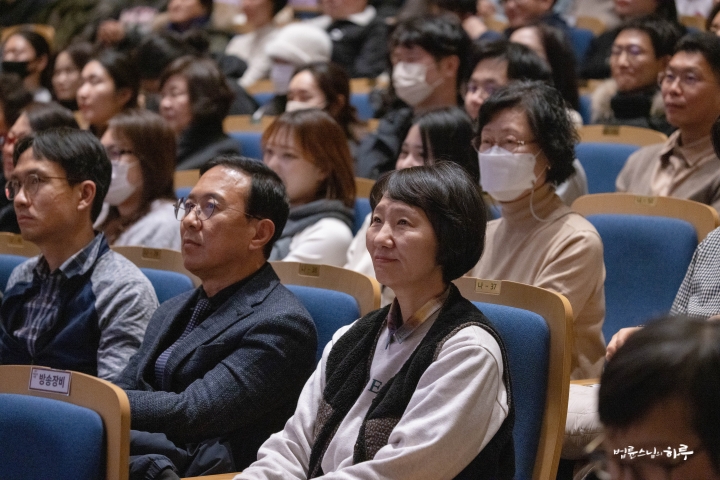
Just because your college major doesn’t directly relate to your job doesn’t mean it’s useless. You can utilize it depending on the situation. For example, if you majored in composition at a music college, you might later compose a jingle for brand promotion at a company. There are many unexpected opportunities to apply what you’ve learned. Nothing goes to waste. So, don’t feel too constrained by your major. If you have a specific goal in the arts or sports field, you can pursue it even when you’re older.
However, the fact that you’ve changed your major twice might indicate that you don’t have a clear goal yet. In that case, why not graduate first and gain diverse experiences through part-time jobs or full-time employment? You might find something that feels right for you. If you then decide that further study is necessary, it’s not too late to go back to university. There’s no problem with going to university in your 40s. Moreover, in the future era where everything will be replaced by AI and automated systems, a university degree is likely to become increasingly conventional. Eventually, we’ll reach a time when not having a university degree won’t be a significant issue.”
“Yes. I have a few things I want to do, but my biggest concern is that women my age, around 25, are already employed and saving up some money.”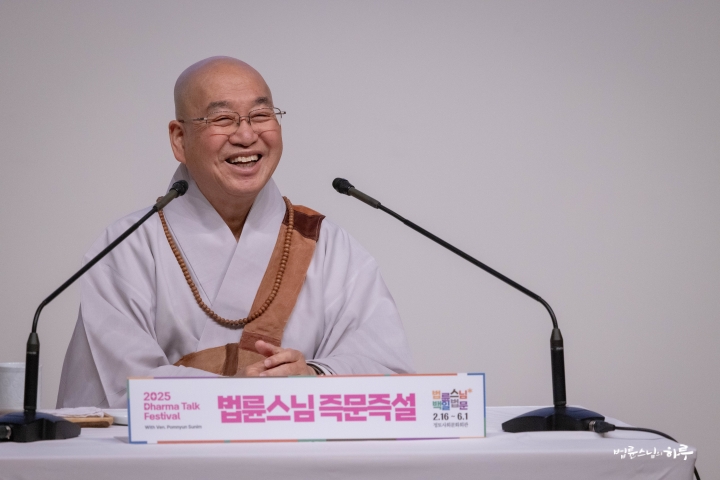
“By that logic, men my age already have grandchildren. That’s unnecessary thinking. We always compare ourselves to the most successful people in our age group. There’s no need to talk about someone our age who’s made 10 billion won, or someone who’s already married with children while we’re still single. There will always be such people. Comparing like this only instills a sense of inferiority in yourself.
The reason you feel inferior is not because you’re inadequate, but because you’re comparing yourself to the best in each field. You compare your singing skills to the best singer, your athletic ability to the best athlete, and your financial status to the wealthiest person. Then you think, ‘I’m not as good at singing, sports, or making money as that person.’ This greed always leads to living with a sense of inferiority. Twenty-five is not even considered an age to worry about. You have no problems at all.”
“Yes. Thank you.”
By the time the conversation ended, it was past 9 PM. Following the guidance of the volunteers, the audience gathered in the main hall all returned home. Sunim expressed his gratitude to the hardworking volunteers before heading to the Jungto Center.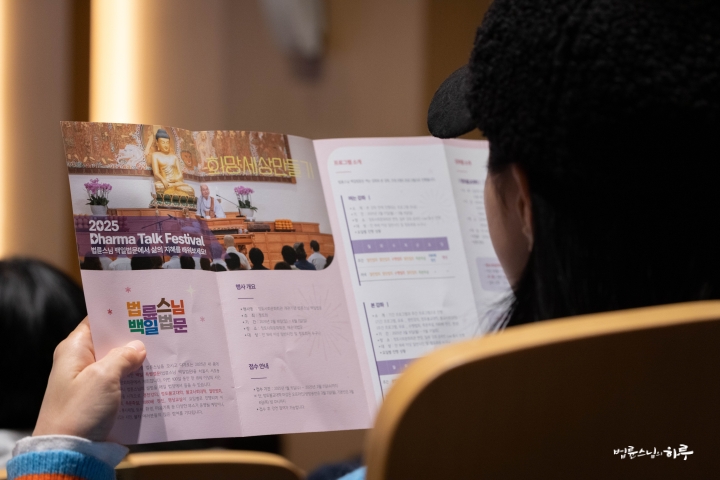
Tomorrow is the sixth day of the 100-Day Dharma Talk. In the morning, there will be a 1080 prostrations practice, and in the afternoon, the graduation ceremony for the Jungto Dharma School will be held.




